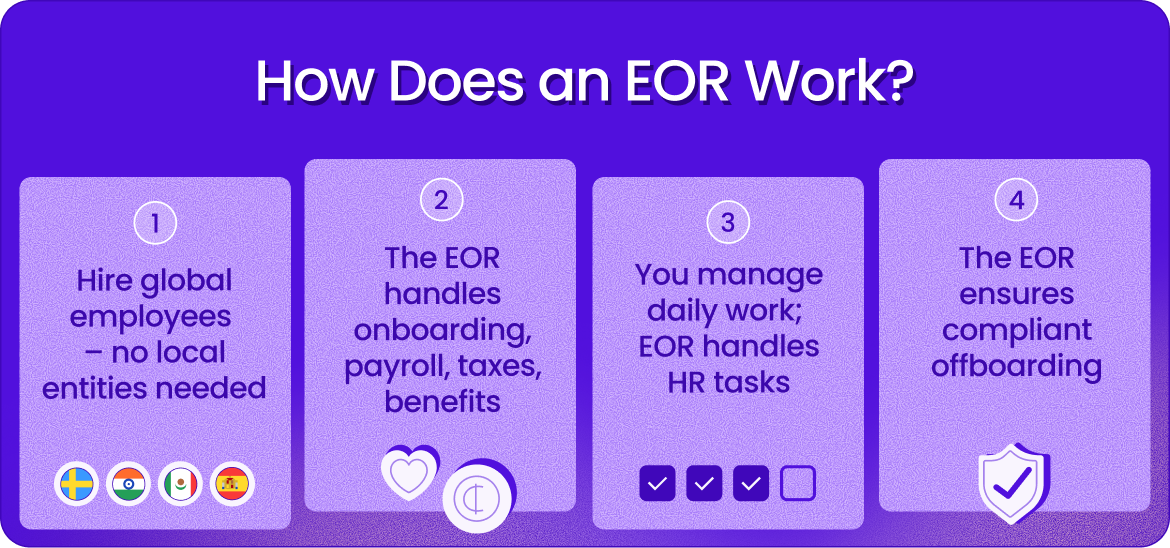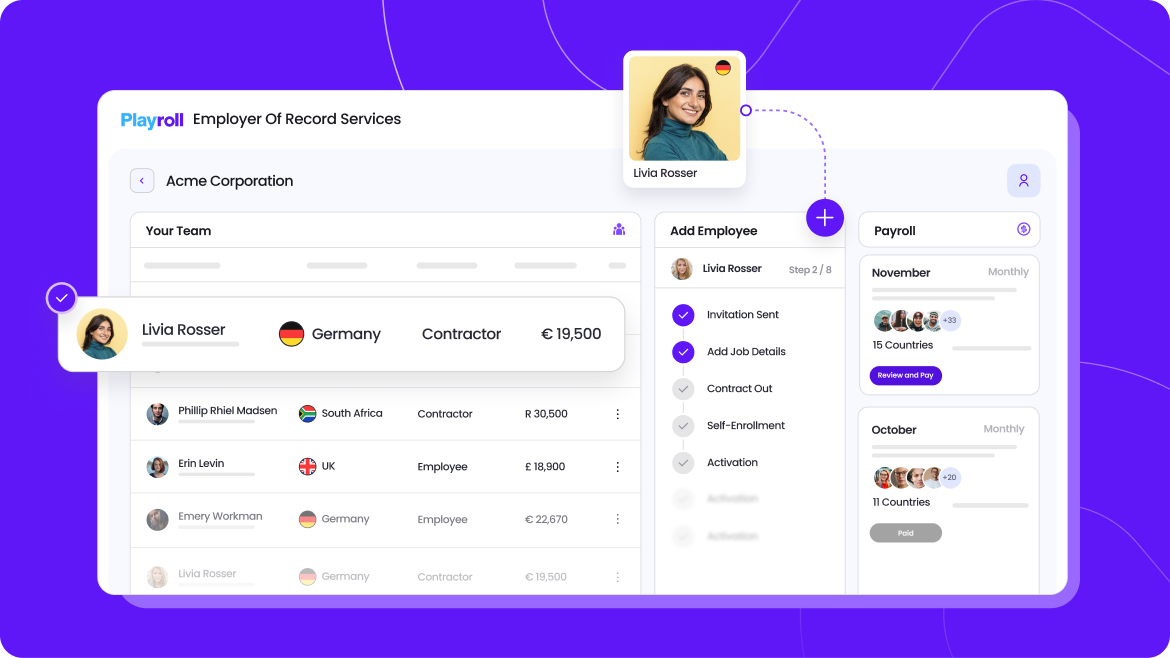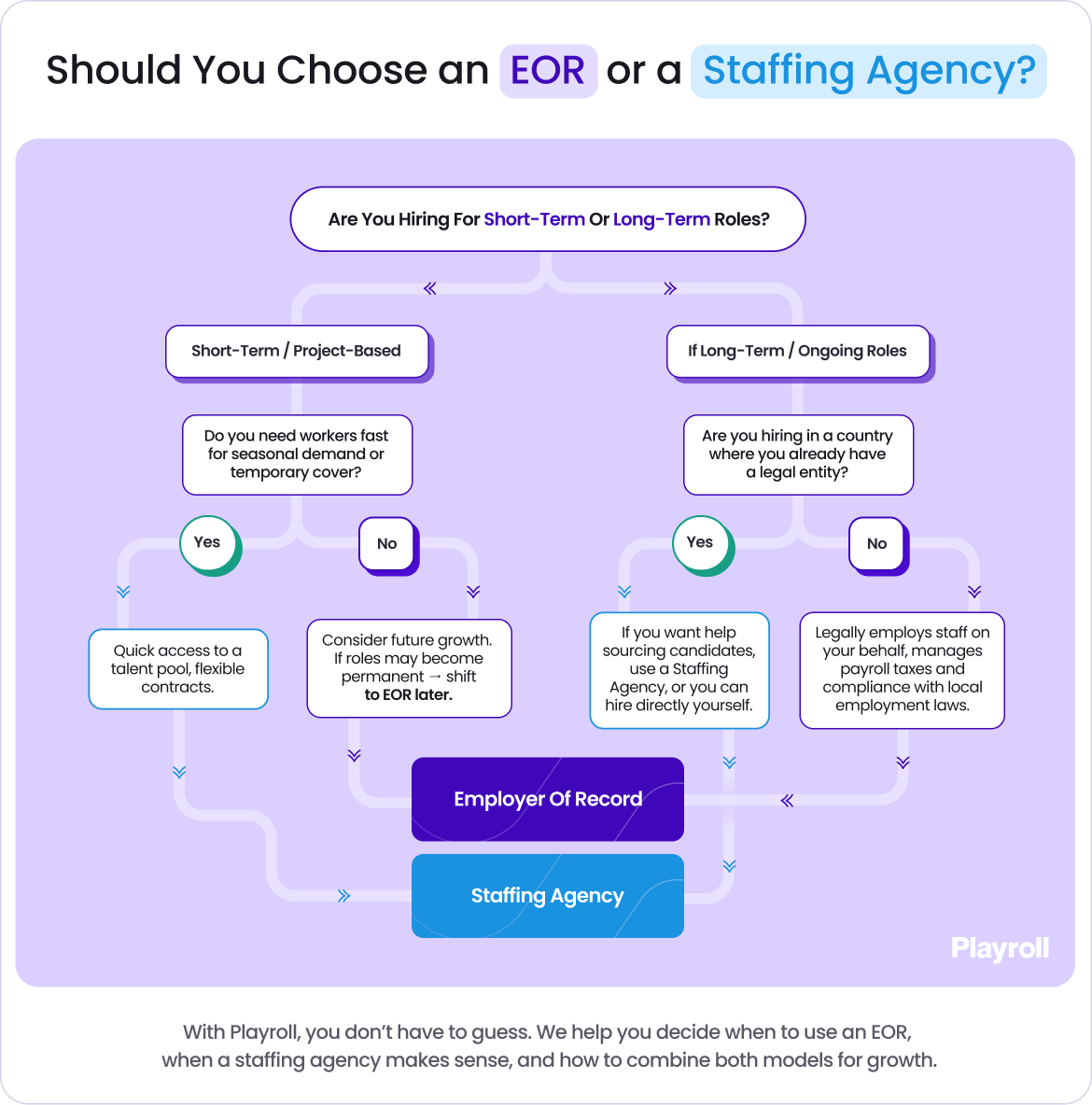Copied to Clipboard
Ready to get Started?


Key Takeaways
An EOR acts as the legal employer, handling payroll, taxes, benefits, and compliance, ideal for long-term international expansion.
A staffing agency focuses on sourcing talent quickly, but legal and payroll responsibilities remain with your company.
EORs offer predictable monthly fees, while staffing agencies charge variable fees tied to salaries, which can become expensive with high turnover.
When you’re scaling your business, you’ll likely be tackling piles of admin, compliance chaos, and decisions stacked on top of more decisions. When you’re untangling these decisions, you’ll likely be faced with the question of Employer of Record vs staffing agency – which is right for you?
Both models help businesses hire abroad, but they serve different purposes. Staffing agencies, specialize in sourcing candidates quickly, while EOR services focus on compliance, payroll, and legally employing talent across borders.
Choosing between the two can make or break your expansion plans. Go the wrong route, and you could face ballooning payroll expenses, compliance fines, and frustrated employees. Choose correctly, and you’ll gain a workforce model that balances speed, cost, and compliance with relevant payroll and tax laws.
What is an Employer of Record (EOR)?
An EOR is a third-party partner that becomes the official, legal employer for your workforce in a specific market. Instead of creating your own legal entity in a new country, you can partner with an EOR, who then takes on all legal responsibilities tied to employment.
This typically includes:
- Running payroll and paying employees correctly
- Withholding and filing payroll taxes and compliance with local employment laws
- Onboarding, timesheet management, and benefits enrollment
- Handling administrative tasks like background checks, contracts, and tax forms
The biggest advantage? An EOR legally employs your team abroad while you focus on managing their work. For companies hiring internationally, this means you can expand quickly without setting up a local branch – saving months of setup time and thousands in payroll costs.

What is a Staffing Agency?
A staffing agency, like Global M for example, is focused on sourcing candidates and placing talent. These agencies connect you with qualified workers, often in temporary, seasonal, or contract roles. Unlike an EOR, however, staffing agencies don’t become the legal employer – which means the responsibility for payroll taxes, compliance with local employment laws, and benefits falls back on you.
Working with a staffing agency typically involves:
- Accessing their talent pool of pre-vetted candidates
- Leveraging their network to fill urgent roles quickly
- Reducing the time your team spends on recruiting and screening
This can be valuable if you need to scale fast. But it’s important to note that staffing agencies don’t handle the legal responsibilities of employment. If you hire through one, you’ll still need your own payroll system to pay employees, track compliance, and file taxes.
Key Differences Between EOR vs. Staffing Agency
When comparing EOR vs staffing agency, the main differences boil down to who legally employs the worker, who manages payroll and compliance, and what services are included. An EOR acts as the full legal employer and manages the entire employment lifecycle. A staffing agency focuses on the hiring process but steps back once the worker is placed.
Here’s how they stack up against one another:
Comparing The Hiring Process With an EOR and Staffing Agencies
Understanding the hiring process is critical when evaluating record vs staffing agencies. While both models aim to get you the talent you need, their involvement in the employment journey differs dramatically.
- EOR Hiring Process: You identify a candidate, and the EOR steps in as the legal employer. They handle everything from onboarding and benefits enrollment to running payroll and ensuring compliance with relevant tax laws. You focus purely on managing performance.
- Staffing Agency Hiring Process: The agency handles sourcing candidates and maybe initial vetting. Once placed, you become the legal employer – which means you’re responsible for payroll, tax filing, and compliance with local labor laws.

Pros and Cons of Using an Employer of Record
Before you partner with an EOR, it’s important to weigh up the benefits and potential trade-offs. An Employer of Record can be a powerful growth lever, but like any workforce model, it’s not a one-size-fits-all solution.
Advantages of an EOR
- Simplifies Global Expansion: No need to set up a local entity, which is often expensive and time-consuming. This frees you up to explore new markets at a faster, affordable pace.
- Compliance Shield: Ensures payroll and employment comply with local laws, reducing the risk of penalties and saving you time to research compliance across jurisdictions.
- Predictable Monthly Payroll Services Fees: With SMBs a clear, consistent cost structure makes budgeting for global hiring simple and transparent. For example, Playroll pricing starts at $399/employee.
- Proven Savings: By consolidating payroll and compliance under one partner, companies avoid the hidden costs of entity setup, local vendors, and legal fees, leading to meaningful long-term savings. Modelwise, for example, cut EOR fees by 40% after switching to Playroll.
- Efficiency Gains: An EOR centralizes payroll, benefits, and compliance processes, reducing administrative overhead and freeing up teams to focus on strategic growth instead of paperwork.
Disadvantages of an EOR
- Vendor Dependency: With an EOR, you rely on them for compliance and payroll - choosing a responsive EOR focused on support is therefore very important.
- Less Flexibility on HR Admin: Because the EOR is the legal employer, they standardize payroll and benefits providers.
Pros and Cons of a Staffing Agency
Staffing agencies shine in speed and flexibility, but they’re not built for long-term compliance or cost efficiency. However, they fall short on long-term compliance and cost efficiency. Higher per-hire fees, limited support for payroll and benefits, and weak retention make them unsustainable for building permanent international teams.
Advantages
- Flexibility in Hiring: Staffing agencies offer businesses the flexibility to quickly scale their workforce up or down based on immediate needs.
- Access to Talent Pool: Employers gain quick access to a diverse talent pool, tapping into the agency's network for recruitment.
- Administrative Burden Reduction: The administrative hassles of recruitment are minimized, allowing businesses to focus on core operations.
Disadvantages
- Quality Concerns: Depending on the staffing agency, the speed of recruitment may sometimes compromise the quality of hires.
- Temporary Arrangements: Staffing agencies often provide temporary staff, which may not be suitable for long-term workforce planning.
In short, while EORs provide comprehensive, global HR solutions, Staffing Agencies are great if you’re looking for agility and flexibility in talent acquisition.
Legal and Compliance Considerations for EORs and Staffing Agencies
Compliance with an employer of record and a staffing agency varies dramatically: one assumes legal responsibilities for payroll and contracts, while the other leaves them with you. Employment law covers payroll taxes, benefits, contracts, and terminations – and who carries that burden depends on the model.
Legal Obligations with EOR
With an Employer of Record compliance is built in. The EOR is the legal employer of record, so it handles payroll taxes, benefits enrollment, and contracts in line with relevant payroll and tax laws. If something goes wrong – such as a misclassification or missed filing – the EOR carries the liability, not you.
Legal Obligations with a Staffing Agency
By contrast, a staffing agency helps you find candidates, but once hired, the responsibility is yours. You remain the legal employer and must stay compliant with local employment laws, process payroll, and manage tax filing. Any mistakes – from late taxes to misclassified staff – fall back on your business.
Cost Breakdown of Employer of Record vs Staffing Agency
Cost is often the deciding factor when weighing up Employer of Record vs staffing agency. Payroll is already one of the largest expenses for any business, so understanding cost models is critical.
EOR Cost Structures
EOR services run on predictable pricing. Businesses generally pay a flat monthly fee per employee or contractor, which covers payroll, tax filings, benefits enrollment, and compliance. This means costs don’t scale up with salary in the same way agency fees do, making EORs appealing for businesses that value cost control and forecasting.
Playroll, for example, charges from $399 per employee/month. That single fee covers payroll, onboarding new hires, benefits, and compliance. For SMBs, this clarity helps control payroll expenses.
Staffing Agency Cost Structures
Staffing agencies use a variable model. Fees are usually calculated as a percentage of the employee’s salary, which can make costs unpredictable. Agencies often charge 15–25% of a hire’s annual salary as a one-time placement fee.
Take for example a $75,000 role. That translates into an extra $11,000–$18,000, before factoring in turnover or multiple hires. Some agencies also add employee fees for replacement guarantees, ongoing admin support, or timesheet management. For businesses with high hiring volume, these extra charges can make staffing agencies significantly more expensive than an EOR over time.
When to Choose EOR vs. Staffing Agency
The right choice between an Employer of Record and a staffing agency depends on your business goals and hiring needs. Both models serve valuable purposes, but they work best in different scenarios.
EORS: Best Suited for Companies Expanding Internationally
An EOR allows businesses to hire abroad without the delays and high costs of opening a local legal entity. By handling payroll, compliance, and benefits, an EOR gives companies the freedom to scale quickly while staying compliant.

Staffing Agencies: Best for Short-Term and Flexible Hiring
Staffing agencies are a good option when speed and flexibility to hire new team members are your priority. They don’t assume legal employment responsibilities, but they can connect businesses with qualified talent quickly. This makes them especially useful for seasonal peaks, special projects, or temporary cover.
How Geography Plays a Part
Geography can be the deciding factor in whether an EOR or a staffing agency makes sense. EORs excel at managing international teams, offering global reach and compliance with local employment laws – making them ideal for businesses expanding into new markets.
Staffing agencies, by contrast, are more effective for local hiring, where regional factors such as labor laws, cultural norms, and talent availability shape the decision.
Country-Specific EOR Hiring Guides
An EOR can give you the infrastructure to hire full-time employees with proper payroll, benefits, and compliance built in. To help you see what this looks like in practice, we’ve put together country-specific hiring guides. Each one breaks down the essentials, from labor laws, to payroll taxes, to benefits, and compliance requirements.
- Hiring in the Philippines
- Hiring in South Korea
- Hiring in Japan
- Hiring in Italy
- Hiring in Germany
- Hiring in Portugal
- Hiring in the USA
- Hiring in Canada
- Hiring in Costa Rica
- Hiring in the UAE
- Hiring in Turkey
- Hiring in South Africa
Transition Between EOR and Staffing Agencies
If you’ve decided that you’d like to shift from either a staffing agency to an EOR, or EOR to a Staffing Agency, there are a couple of things you should think about before you go say all systems go.
- Define Your Long-Term Hiring Goals: Decide whether you need short-term flexibility (staffing agency) or long-term compliance and stability (EOR). This will help you decide if making the transition is the right move or not.
- Assess Timing and Scalability: Are you scaling in-country? Do you need support expanding into a new market? An EOR is best when you’re ready to scale full-time headcount in a new market, while a staffing agency may be sufficient for pilot projects or seasonal work.
- Plan For Compliance Changes: Moving from a staffing agency to an EOR often requires updating contracts, payroll taxes, and benefits to align with local labor laws. Anticipate these adjustments early on to avoid having to pay unnecessary penalties.
- Minimize Operational Disruption: Build a phased transition plan that allows employees to keep your team working without interruption or additional stress while contracts and payroll structures are shifted.
- Weigh Short-Term Costs Against Long-Term Value: Switching between a staffing agency and an EOR will involve some upfront admin and fees. Make sure that you budget these in so that you’re balancing short-term needs with the model that best supports your future hiring strategy.
Manage Your Global Workforce Compliantly With Playroll’s EOR
Choosing between an EOR and a staffing agency ultimately comes down to what your business needs most: speed and flexibility or long-term compliance and stability. If you’ve decided that an Employer of Record is the right choice for you, book a demo to get started with Playroll.
EOR vs Staffing Agency FAQs
What is the difference between a staffing agency and an Employer of Record?

.png)
Although an EOR and staffing agency might seem similar, there are some distinct differences. A staffing agency helps you find and place candidates, often for temporary roles, but you remain the legal employer. An EOR legally employs the worker on your behalf, handling payroll, contracts, taxes, and compliance.
When to use an Employer of Record?

.png)
Use an Employer of Record when hiring in a country where you don’t have a legal entity, when you need compliance guaranteed, or when building a long-term global workforce. They’re ideal for SMBs testing new markets or scaling quickly.
Can I use both an EOR and a staffing agency?

.png)
Yes, you can use both an EOR and a staffing agency. Many companies use staffing agencies to source candidates, then rely on an EOR to legally employ them and manage payroll. This combines speed of hiring with compliance and stability.
Are staffing agencies cheaper than EORs for hiring?

.png)
Staffing agencies are not necessarily cheaper than an EOR. Agencies often charge 15–25% of a candidate’s salary, which can add $11k–$18k for a $75k role. EORs charge predictable monthly fees (e.g., Playroll: $399 per employee), which is usually more cost-effective for long-term hires.
.svg)
.svg)
.svg)

.svg)
.svg)




.png)


.png)

.svg)















.svg)